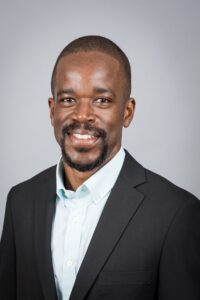Fairness and Population Diversity
A conversation with Mitchell Momanyi, FSA, MAAA, on advancing actuarial knowledge on these important issues
April 2024
Part of the Society of Actuaries (SOA) mission is to empower the world with valuable insights from actuarial knowledge. Exceptional individuals from the SOA community embody this by working to impact society positively. The SOA’s Diversity, Equity and Inclusion (DEI) Strategic Research Program also participates in this mission and offers transformative power through groundbreaking research with a societal purpose.
Someone who helps drive this work is SOA volunteer Mitchell Momanyi, FSA, MAAA. Momanyi, a senior director and actuary for the Market Economics team at Navvis, a solutions-based operating partner of U.S. health systems, health plans and physician enterprises, lends his insights and expertise to the SOA’s DEI Strategic Research Program Steering Committee. The SOA recently sat down with him to discuss the committee’s mission, work and his role.
When was the DEI Strategic Research Program Steering Committee formed? How does this kind of research help the SOA fulfill its societal purpose?
The SOA called its members to champion diversity, equity and inclusivity. Part of that call to action was to research dimensions of population diversity that intersect with actuarial work and affect the industries and sectors actuaries serve. So the SOA formed the DEI Strategic Research Program Advisory Council in 2020, which transitioned to a steering committee in 2023.
Examples of projects this steering committee has overseen include:
- A study outlining the ethical risks that arise from using artificial intelligence (AI) in actuarial practice
- Analyses of several aging and retirement issues affecting people of different races and ethnicities
- Asurvey that uncovered the disruptive impact of the COVID-19 pandemic on actuarial careers—especially for women
- Essays tackling the issues lesbian, gay, bisexual, transgender, queer (or questioning) and other identifications (LGBTQ+) community members and their families experience with insurance
This category of research helps the SOA fulfill its societal purpose by shedding light on DEI issues affecting the actuarial profession. We also equip actuaries with tools to provide expert advice and relevant solutions.
How long have you been a DEI Strategic Research Program Steering Committee member, and what inspired you to join?
I joined in the spring of 2022, and I was inspired by the SOA Research Institute’s commitment to objective research into industry-relevant issues related to population diversity. I was glad the SOA was using its actuarial lens to look into issues of racial and ethnic disparities, especially in insurance and risk management. It’s an area in which I believe actuaries have a key role to play, and that’s what drove and inspired me to join.
How is the leadership of the DEI Strategic Research Program Steering Committee structured?
An advisory council initially led the program, but this transitioned to a steering committee in 2023. This changed the leadership structure of the program but not its purpose. Having a steering committee lead the DEI program brings it in line with the SOA Research Institute’s other strategic research programs.
Also, when an advisory council oversaw this program, the SOA Research Institute staff organized and led the meetings and set the agenda. Our steering committee has a chair and vice chair, and volunteers run the meetings. The SOA Research Institute staff still provides support, but volunteers drive the program more.
As a health actuary, how do you apply your knowledge and skills to your DEI Strategic Research Program Steering Committee role?
One way I’ve applied my experience to my role as a steering committee member is related to brainstorming research project ideas. Since the committee is a multidisciplinary group, I use my experience as a health actuary to contribute ideas related to health care research.
I’ve also used my health actuarial expertise as a member of project oversight groups (POGs), which serve as one of the SOA Research Institute’s mechanisms to successfully guide a research project from start to finish. For example, a POG meets with researchers regularly. The members may talk about the timing of key deliverables, whether there are data issues and how to deal with them, and other challenges that may arise. Furthermore, if something in the project is not going as planned, the POG will work with the researchers to steer it back on track. A big part of the POG’s activities is peer review. So, a POG will include members with relevant expertise who conduct a peer review to make sure the results and conclusions make sense. Peer review also maintains objectivity within the research project.
I recently chaired a POG for research related to long-term care services and support. In particular, I contributed knowledge based on my experience with public insurance programs, such as Medicare and Medicaid.
How has your involvement with the DEI Strategic Research Program Steering Committee impacted you professionally?
As a member of the steering committee, I have been fortunate to interact with actuaries across multiple disciplines. I’m a health care actuary, but the steering committee includes actuaries from several other fields, such as life, retirement, technology (e.g., AI) and financial risk management. In my day-to-day job, I might not interact with actuaries spanning such a wide breadth of expertise. This has been an excellent opportunity to be in the same room with various disciplines, and because of this, I’ve learned how to approach risk management solutions from different perspectives.
Second, I’ve learned a lot about the issues related to diversity that consumers in the insurance industry face. I also have a better understanding of the professionals and institutions that are tasked with designing solutions to these issues and challenges.
Finally, I’ve been fortunate to add my voice to emerging risk research in an objective way.
What DEI Strategic Research Program studies are in the works for 2024?
Here are some examples of projects planned or already underway for 2024:
- Analyzing various metrics that measure certain aspects of retirement preparedness by race, ethnicity, gender, age and income
- Identifying quantitative metrics for evaluating fairness for life insurance products and analyzing them against different definitions of fairness
- Exploring issues of aging and retirement in the LGBTQ+ community
Since its formation in 2020, the SOA Research Institute’s DEI Strategic Research Program has helped develop several studies and research reports on a variety of topics, including health care, retirement and mortality. Explore issues related to population diversity on industry-relevant topics by perusing reports and other resources on the DEI Strategic Research Program landing page on SOA.org.
Statements of fact and opinions expressed herein are those of the individual authors and are not necessarily those of the Society of Actuaries or the respective authors’ employers.
Copyright © 2024 by the Society of Actuaries, Chicago, Illinois.

